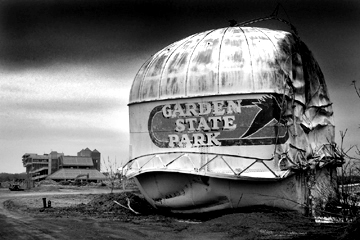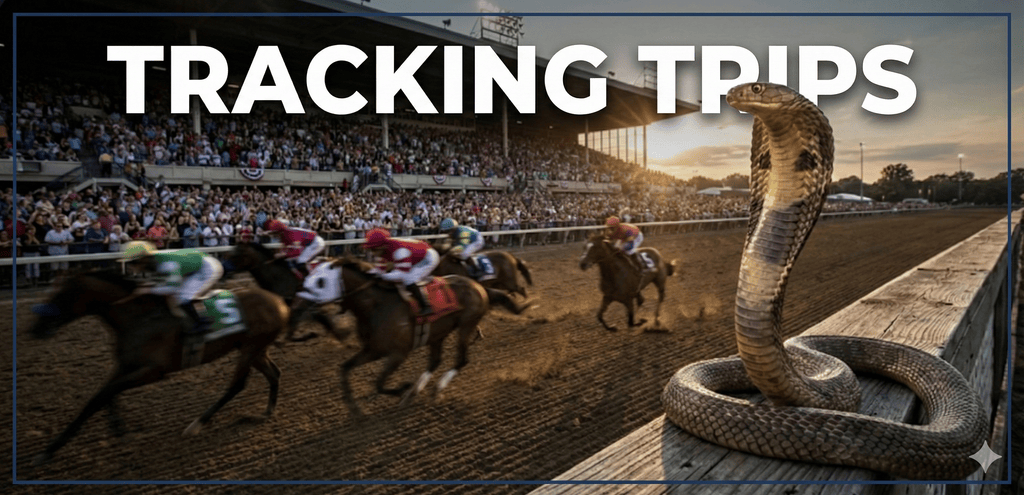
Today’s horse racing fans might remember Garden State Park as the swindler-owned racetrack that “ruined” the 1985 Triple Crown. But to the New Jersey horse people who raced there, it was our winter palace. With its castle-like grandstand, opulent Phoenix restaurant and elegant crystal paddock, Garden State Park was a fairy tale, rising from the ashes and promising to bring prosperity back to New Jersey racing. Until its flame flickered out.
Garden State Park opened July 7, 1942 after much construction delays due to wartime rationing. As a result, its ornate grandstand was constructed primarily of wood which ultimately led to its first downfall. In its heyday Garden State was one of the nation’s top tracks in attendance and handle. Three Triple Crown winners raced at Garden – Whirlaway, Citation and Secretariat. In the 1950’s and 60’s, New Jersey racing thrived and Garden State Park along with Atlantic City Racecourse and Monmouth Park were referred to as the “Golden Triangle”.
On April 14, 1977, Garden State Park’s wooden grandstand burned to the ground. The track had been in decline for several years prior to the fire and its future seemed bleak. Garden needed a champion. What it got was a con artist. Robert Brennan, head of First Jersey Securities stepped in and bought the track for the bargain price of $15.5 million. Since he was using other people’s money, Brennan spared no expense in building what he called the “Racetrack of the 21st Century” – to the tune of $170 million.

Oh but it was beautiful, especially for us horse people – winterized barns, clean rent-free dormitories for the backstretch workers, wash stalls with abundant hot water, heated tack rooms and most of all, a diligent staff at the racing office. One of my fondest memories of Garden is when Cigar ran in the 1996 Dubai World Cup. Due to the time difference, it was morning when the race went off and a bunch of us trainers all crammed in the racing office around a small TV to cheer him on. For most of us New Jersey trainers, Garden was our winter home. New Jersey didn’t have any year-round tracks so we bounced around like gypsies – in the summer you either went to Atlantic City or Monmouth Park, in the fall you could stable at Meadowlands or hole up at a training facility but in the winter, everyone went to Garden.
Garden State Park’s biggest legacy was luring Spend A Buck away from running in the 1985 Preakness and Belmont Stakes. Brennan offered a then obscene two million dollar bonus to any horse that could sweep the Cherry Hill Mile, the Garden State Stakes, the Kentucky Derby and the Jersey Derby. The task seemed almost as impossible as winning the Triple Crown – four races in seven weeks. Even after Spend A Buck won the Cherry Hill Mile and Garden State Stakes, the bonus was viewed as nothing more than a publicity stunt. Until Spend A Buck won the Derby. Back then the Triple Crown was big on prestige but small on purse monies and there was no bonus offered for winning all three races. Brennan’s big payday wasn’t without precedent – the largest purse money ever won by the great Secretariat came not in any of his Triple Crown races but rather when he won the Garden State Stakes at the Cherry Hill track.
Spend A Buck’s connections did the math and chose to skip the Preakness and Belmont and run in the Jersey Derby instead. There was an immediate backlash in the racing community which culminated in Pimlico’s general manager Chick Lang calling Robert Brennan “a snake oil salesman.” Controversy or not, Spend A Buck valiantly held on by a neck to earn his $2.6 million dollar check, which was the largest single purse in American history for nineteen years after the race. It also proved that his connections had made the right decision. Spend A Buck was a brilliant racehorse who could carry his speed, but struggled at the longer distances and most likely would not have fared well in the Belmont Stakes. There was one upside to the whole fiasco – the following year a bonus was finally instituted for any horse who won the Triple Crown.
After the 1985 Triple Crown That Wasn’t brouhaha died down, Garden State Park never again attained such recognition on a national level. However its savior Robert Brennan achieved personal notoriety when he was convicted on seven counts of money laundering and bankruptcy fraud. Declining attendance, small handles and the Atlantic City casino lobby all took their toll and on May 3rd, 2001 Garden State ran its last race. New Jersey’s Golden Triangle had lost a leg and fourteen years later, it collapsed when Atlantic City Racecourse also closed its doors. The fairy tale was over and along with it, the heart of the New Jersey Thoroughbred racing industry.



